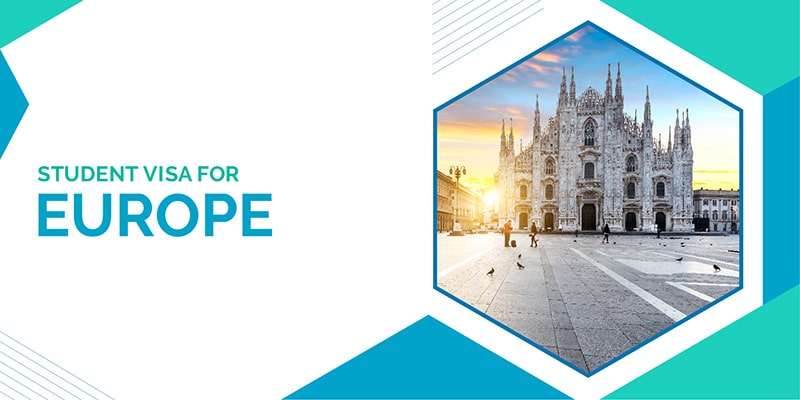Planning to Study Abroad? Register Now & Get a Call from Us.
- Home >
- Study Abroad >
- Study in Europe >
- STUDENT VISA FOR EUROPE
Europe has been one of the most favourite study destinations of international students for quite a few decades now. The advantage with Europe is that it comprises of fifty sovereign states, almost all of which are highly developed countries, offering students the best academic infrastructure, and a high standard of education. Because Europe has many countries, and each one of them have its own visa-related rules, we will discuss the types of visas and other relevant details in this article.

Schengen Visa Europe
This is a temporary student visa for those international students who want to visit a Schengen countries for academic purposes, for a maximum of three months. This visa can be renewed after it expires, and if a student is selected for his visa programme, he/she can apply for a residence permit. It is possible to obtain Schengen study visa without IELTS score or other language tests if the institution students have picked does not ask for it. However, it is always advisable to make sure about the admission and visa requirements before applying, as the countries evaluate the visa applications individually and the rules are not the same for everyone. Candidates should keep in mind that they cannot convert schengen visa to work permit, and they can only apply for a work permit from outside of EU countries.
The Schengen Visa Fees for non-EU students above age 12 is 60€, for students up to 12 is 35€, and there is no schengen visa fee for the candidates below 6 years of age. There is no age limit for study in Europe or Schengen Visa, the minors are just required to have more documents like permission letter from the parents.
Long Stay Visa Europe For Students:
This Long-Stay Study visa is usually issued to international students if they enroll in courses and programmes for which they need to stay for more than six months. This visa includes a residency permit.
Language Courses Student Visa in Europe:
For students who want to pursue courses or programmes which are conducted in the language of the host country, it is mandatory to have a certain level of proficiency in that language. There may also arise situations when a student is required to go to Europe to appear for a language based test. This visa comes in handy then.
Student Application Visa
In some cases, the universities’ responses to students’ applications are delayed. In such cases, if the student is sure of the fact that he/she will be invited to join the course or programme at the university, he/she may apply for this visa. The advantage with this visa is that it will ensure that the student is able to enroll in his/her course or programme at the university before the deadline.
Student Visa in Europe:
This is the most common form of visa available for international students. When a student has the offer of admission, or the admission letter in his/her hands, he/she may apply for this visa. The admission letters usually state that the students can enter that country for pursuing a given course or programme in that university. In most cases, this visa is issued for a period of three months, after which if a student wants to stay in the country, he/she needs to register himself/herself in the Foreigners’ Registration Office in the city where his/her university is located. There are different set of rules for dependents and Study in Europe Visa with spouse for different countries. With Schengen, you can apply for a couple of countries like Denmark and Sweden together, but not everywhere in the Europe.
Europe Study Visa without IELTS
There are Universities in Europe that let you Study in Europe without IELTS, but does stand the same for the visa? For that, one has to get in touch with the universities and the embassy of the country you are willing to go. Some of the Visa process, students will have to appear for video interviews and for some, you will have to submit a non objection letter from the University, to the country's embassy. For most cases, the visa success rate increases with IELTS scores.
Documents Required for Europe Visa
Once a student decides to go abroad, and starts applying to various universities, it becomes important for him/her to get his/her documents in place, too! To apply for a visa and get it, these are the visa requirements:
- Entry visa application form
- Recent passport size photographs
- Valid travel documents
- Proof of accommodation in Europe
- Proof that the student has sufficient financial support to fund his/her study and stay in Europe
- Paid health insurance
- Copy of all previous educational certificates
- Acceptance letter from the university he/she had applied to
- Receipt of the visa application fees
It is important to remember a few things, when one applies for a student visa. One must possess a valid passport that has a few blank pages. It will also be necessary to provide the flight itinerary, if asked for. An international student who wishes to pursue higher studies in Europe must not have criminal records of any kind. One must apply for an education visa on the prescribed visa form, at that country’s embassy in his/her home country. An interview for getting the visa should be scheduled at least four weeks in advance. The visa processing time could be between two to four weeks. The Europe visa cost is usually five thousand rupees. Further, it is possible to get a visa without IELTS. In addition, getting a dependent visa is not a troublesome affair at all. Therefore, for Indian students who want to pursue higher studies abroad, study in Europe on a study visa is simply the best option!
Post Study Work Visa in European Countries:
Most countries in Europe allow students to stay back with an extension in the residence permit, once their study in Europe programs are over. Students can apply for an extension on their residence permit while looking for the job. The average stay back options after masters degree in Europe is somewhere around one to two years after the program is over. The students can apply for the work permit once they have secured the job in the country they have applied to. However, the continent is made of more than 40 countries, and the rules of visa, post study stay back and post study work visa will change with the countries. As we have mentioned earlier, it is important to check before applying for a particular country. You can find out the information on various countries here: Best European Countries to Study and Work
Top Courses to Study in Europe
What do you want to study abroad?
Browse By Countries
Where do you want to study abroad?
Reach Out To Us
Register here to get newsletters for the latest study abroad news & free counselling assistance.






